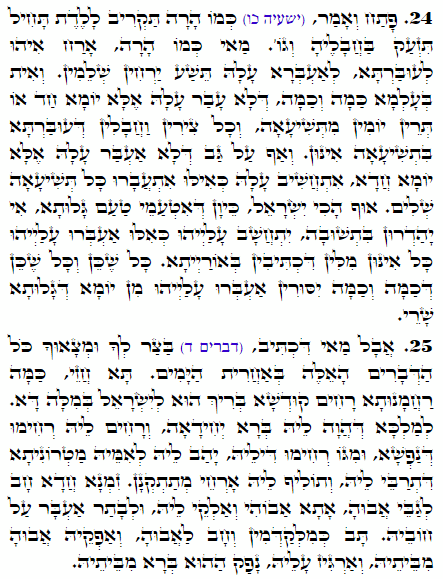Daily Zohar # 1761 – Ki Tisa – Like the pain of a pregnant woman

.
Hebrew translation:
25. אֲבָל מַהוּ שֶׁכָּתוּב (דברים ד) בַּצַּר לְךָ וּמְצָאוּךָ כֹּל הַדְּבָרִים הָאֵלֶּה בְּאַחֲרִית הַיָּמִים – בֹּא וּרְאֵה כַּמָּה רַחֲמָנוּת רִחֵם הַקָּדוֹשׁ בָּרוּךְ הוּא אֶת יִשְׂרָאֵל בַּדָּבָר הַזֶּה. לְמֶלֶךְ שֶׁהָיָה לוֹ בֵּן יְחִידִי וְאָהַב אוֹתוֹ אַהֲבַת נֶפֶשׁ, וּמִתּוֹךְ אַהֲבָתוֹ נָתַן אוֹתוֹ לְאִמּוֹ הַגְּבִירָה שֶׁתְּגַדֵּל אוֹתוֹ וּתְלַמֵּד אוֹתוֹ דְּרָכִים מְתֻקָּנוֹת. פַּעַם אַחַת חָטָא לְאָבִיו, בָּא אָבִיו וְהִלְקָה אוֹתוֹ, וְאַחַר כָּךְ עָבַר עַל חֶטְאוֹ. שָׁב כְּמִקֹּדֶם וְשׁוּב חָטָא לְאָבִיו, וְהוֹצִיא אוֹתוֹ אָבִיו מִבֵּיתוֹ וְרָגַז עָלָיו. יָצָא אוֹתוֹ בֵן מִבֵּיתוֹ.
.
Zohar Ki Tisa
Deuteronomy 4:30
“בַּצַּר לְךָ–וּמְצָאוּךָ, כֹּל הַדְּבָרִים הָאֵלֶּה; בְּאַחֲרִית, הַיָּמִים, וְשַׁבְתָּ עַד-יְהוָה אֱלֹהֶיךָ, וְשָׁמַעְתָּ בְּקֹלוֹ”
“”When you are in distress and all these things have come upon you, in the latter days you will return to YHVH your God and listen to His voice.”
In the book of Deuteronomy Moses prepares the nation for the future process of correction that they will have to go through without him. Moses tells them about the hardship and also tells them that the key to overcoming the process of correction is to follow the ways of the Torah.
Connecting to the Torah draws the mercy and protection of God, as it says in the following verse.
Deuteronomy 4:31
“ כִּי אֵל רַחוּם יְהוָה אֱלֹהֶיךָ, לֹא יַרְפְּךָ וְלֹא יַשְׁחִיתֶךָ; וְלֹא יִשְׁכַּח אֶת-בְּרִית אֲבֹתֶיךָ, אֲשֶׁר נִשְׁבַּע לָהֶם”
“For the LORD your God is a merciful God. He will not leave you or destroy you or forget the covenant with your fathers that he swore to them.”
Isaiah 26:17
“כְּמוֹ הָרָה תַּקְרִיב לָלֶדֶת, תָּחִיל תִּזְעַק בַּחֲבָלֶיהָ–כֵּן הָיִינוּ מִפָּנֶיךָ, יְהוָה”
“As the pregnant woman approaches the time to give birth, She writhes and cries out in her labor pains, Thus were we before You, YHVH.”
The Zohar tells us that at the end of days the pain of the Tikkun process will be like a pregnant woman giving birth. The pregnancy may start with joy and ease but as it comes to the end we want to finish with the process as quickly as possible.
Many good people experience hardship in this generation. It comes in all aspects of life depending on the history of the individual Tikkun process.
People may live a good life and suddenly everything turns upside down and pain is coming from different directions. It is how God shows us his mercy. If God leaves us alone it is like a father that gave up on his child.
A process of painful cleansing must come before seeing the light. We should welcome the process because our goal is to see a new life and continuation of the light in the world. A pregnant woman waits for the moment to hold her baby and see his soul through his eyes. That baby for the mother represents the aspect of immortality because life continues. Accepting the process will lead us to the light at the end of the dark tunnel where we will see immortality.
{||}

 Previous: Ki Tisa
Previous: Ki Tisa

